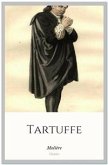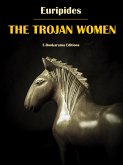Among Molière's best-known works is "Tartuffe" (AKA "The Hypocrite"), written in 1664. Though "Tartuffe" was received well by the public and even by Louis XIV, its popularity was lessened when the Archbishop of Paris issued an edict lasting 5 years threatening excommunication for anyone who watched, performed in, or read the play.
Molière's masterpiece 'Tartuffe'' is a story about a man who falls prey to misplaced adoration. The dramatic work presents several dramatic features which define the play as a comedy of manners. Of particular importance is Molière's satirical look at religious hypocrisy.
Tartuffe, a pious fraud who pretends to speak with divine authority, has insinuated himself into the household of Orgon. When Orgon announces that his daughter Mariane is to marry Tartuffe instead of her fiance Valère, the rest of the family realizes the extent of Tartuffe's influence over Orgon. Tartuffe tries to seduce Orgon's wife Elmire, who traps him into revealing to Orgon his intentions toward her. Orgon throws Tartuffe out of the house, Tartuffe returns with an order of eviction for the family, and at the final moment the tables are turned and the play ends happily.
Molière's masterpiece 'Tartuffe'' is a story about a man who falls prey to misplaced adoration. The dramatic work presents several dramatic features which define the play as a comedy of manners. Of particular importance is Molière's satirical look at religious hypocrisy.
Tartuffe, a pious fraud who pretends to speak with divine authority, has insinuated himself into the household of Orgon. When Orgon announces that his daughter Mariane is to marry Tartuffe instead of her fiance Valère, the rest of the family realizes the extent of Tartuffe's influence over Orgon. Tartuffe tries to seduce Orgon's wife Elmire, who traps him into revealing to Orgon his intentions toward her. Orgon throws Tartuffe out of the house, Tartuffe returns with an order of eviction for the family, and at the final moment the tables are turned and the play ends happily.









